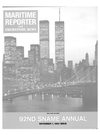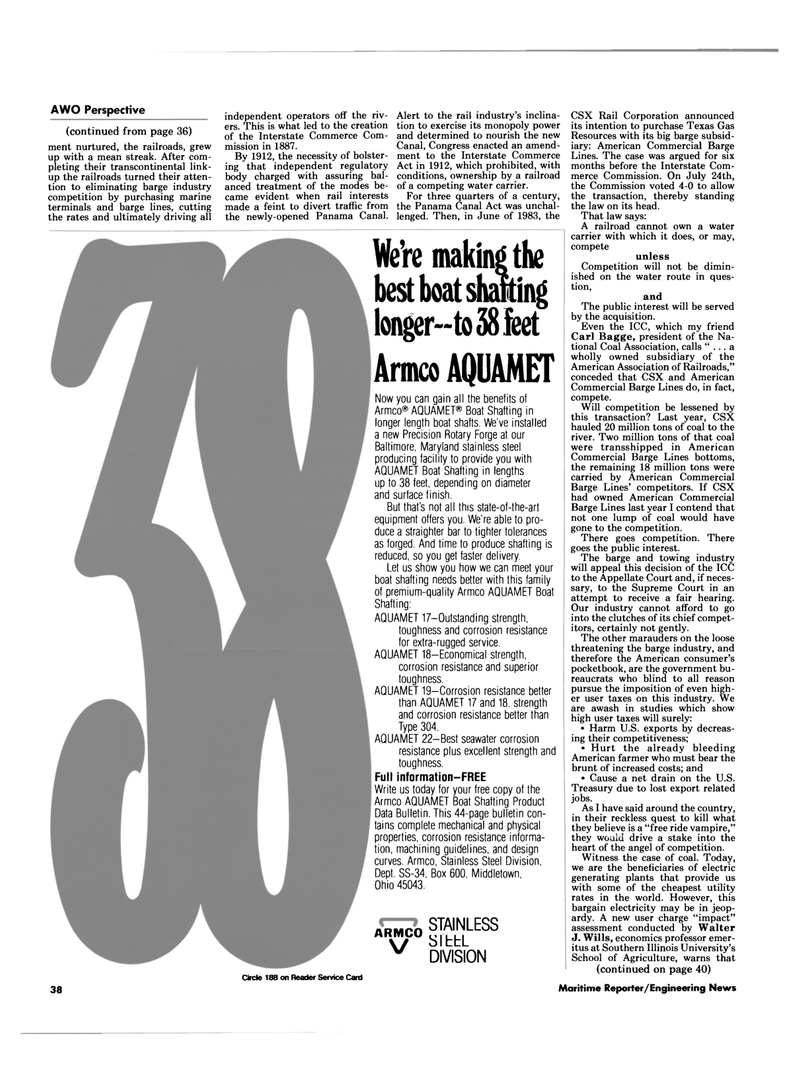
Page 34: of Maritime Reporter Magazine (November 1984)
Read this page in Pdf, Flash or Html5 edition of November 1984 Maritime Reporter Magazine
AWO Perspective (continued from page 36) ment nurtured, the railroads, grew up with a mean streak. After com- pleting their transcontinental link- up the railroads turned their atten- tion to eliminating barge industry competition by purchasing marine terminals and barge lines, cutting the rates and ultimately driving all independent operators off the riv- ers. This is what led to the creation of the Interstate Commerce Com- mission in 1887.
By 1912, the necessity of bolster- ing that independent regulatory body charged with assuring bal- anced treatment of the modes be- came evident when rail interests made a feint to divert traffic from the newly-opened Panama Canal.
Alert to the rail industry's inclina- tion to exercise its monopoly power and determined to nourish the new
Canal, Congress enacted an amend- ment to the Interstate Commerce
Act in 1912, which prohibited, with conditions, ownership by a railroad of a competing water carrier.
For three quarters of a century, the Panama Canal Act was unchal- lenged. Then, in June of 1983, the
We're making the best boat shafting longer—to 38 feet
Armco AQUAMET
Now you can gain all the benefits of
Armco® AQUAMET® Boat Shafting in longer length boat shafts. We've installed a new Precision Rotary Forge at our
Baltimore, Maryland stainless steel producing facility to provide you with
AQUAMET Boat Shafting in lengths up to 38 feet, depending on diameter and surface finish.
But that's not all this state-of-the-art equipment offers you. We're able to pro- duce a straighter bar to tighter tolerances as forged. And time to produce shafting is reduced, so you get faster delivery.
Let us show you how we can meet your boat shafting needs better with this family of premium-quality Armco AQUAMET Boat
Shafting:
AQUAMET 17—Outstanding strength, toughness and corrosion resistance for extra-rugged service.
AQUAMET 18—Economical strength, corrosion resistance and superior toughness.
AQUAMET 19—Corrosion resistance better than AQUAMET 17 and 18, strength and corrosion resistance better than
Type 304.
AQUAMET 22—Best seawater corrosion resistance plus excellent strength and toughness.
Full information-FREE
Write us today for your free copy of the
Armco AQUAMET Boat Shafting Product
Data Bulletin. This 44-page bulletin con- tains complete mechanical and physical properties, corrosion resistance informa- tion, machining guidelines, and design curves. Armco, Stainless Steel Division.
Dept. SS-34, Box 600, Middletown,
Ohio 45043.
ARMCO STAINLESS w blthL
V DIVISION
Ode 188 on Reader Service Card 38
CSX Rail Corporation announced its intention to purchase Texas Gas
Resources with its big barge subsid- iary: American Commercial Barge
Lines. The case was argued for six months before the Interstate Com- merce Commission. On July 24th, the Commission voted 4-0 to allow the transaction, thereby standing the law on its head.
That law says:
A railroad cannot own a water carrier with which it does, or may, compete unless
Competition will not be dimin- ished on the water route in ques- tion, and
The public interest will be served by the acquisition.
Even the ICC, which my friend
Carl Bagge, president of the Na- tional Coal Association, calls "... a wholly owned subsidiary of the
American Association of Railroads," conceded that CSX and American
Commercial Barge Lines do, in fact, compete.
Will competition be lessened by this transaction? Last year, CSX hauled 20 million tons of coal to the river. Two million tons of that coal were transshipped in American
Commercial Barge Lines bottoms, the remaining 18 million tons were carried by American Commercial
Barge Lines' competitors. If CSX had owned American Commercial
Barge Lines last year I contend that not one lump of coal would have gone to the competition.
There goes competition. There goes the public interest.
The barge and towing industry will appeal this decision of the ICC to the Appellate Court and, if neces- sary, to the Supreme Court in an attempt to receive a fair hearing.
Our industry cannot afford to go into the clutches of its chief compet- itors, certainly not gently.
The other marauders on the loose threatening the barge industry, and therefore the American consumer's pocketbook, are the government bu- reaucrats who blind to all reason pursue the imposition of even high- er user taxes on this industry. We are awash in studies which show high user taxes will surely: • Harm U.S. exports by decreas- ing their competitiveness; • Hurt the already bleeding
American farmer who must bear the brunt of increased costs; and • Cause a net drain on the U.S.
Treasury due to lost export related jobs.
As I have said around the country, in their reckless quest to kill what they believe is a "free ride vampire," they would drive a stake into the heart of the angel of competition.
Witness the case of coal. Today, we are the beneficiaries of electric generating plants that provide us with some of the cheapest utility rates in the world. However, this bargain electricity may be in jeop- ardy. A new user charge "impact" assessment conducted by Walter
J. Wills, economics professor emer- itus at Southern Illinois University's
School of Agriculture, warns that (continued on page 40)
Maritime Reporter/Engineering News

 33
33

 35
35
